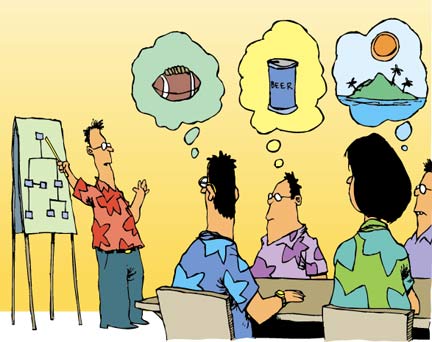
|

|
Meetings:
Can’t kill ’em
But there are ways you can
make them run better and
not waste everyone's time
Among the many "love-hate" relationships that we experience in life, meetings would rank at the top of many people's lists. I thought I'd heard all the standard clichés and snide remarks but a new one caught my attention: "Meetings are places where someone takes minutes but everyone wastes hours."
So what I'd like to do in this article is first offer a few simple questions, which will take only a minute to explore, but might save everyone from feeling that they've wasted yet another hour. And second, ask you to consider an even harder question that might lead you to an even deeper understanding of what leads people to roll their eyes in resignation at yet the thought of another meeting that will "keep them from their real work."
Question One: What does your agenda tell people?
Take a good look at the meeting agenda you send out. Does it just list topics/times? Discuss Project X (10 minutes). Discuss Issue Y (15 minutes).
Or does it list clear outcomes and processes? Here are a few examples:
» Provide consultative input to Person A on Issue Y.
» Agree, together, on what to do about Issue Z.
In the second case, we see three very different types of discussions, each leading to a different outcome. Each, as we shall see below, requiring different behaviors for attendees to be successfully achieved.
Question Two: Do attendees understand their specific roles in contributing to the achievement of each of the agenda items?
Everyone's behavior, including the formal leader's, must be aligned with the particular agenda item. When being informed about the status of Project X, my job as a member is to
» Ask questions for clarification.
» Demonstrate that I understand what is being said.
As the person receiving this consultative input, my job would be gate keeping -- keeping everyone talking to me vs. arguing with each other.
Why no arguing? Because the only place where differences need to be ironed out is during that part of the meeting when a consensus decision must be made. During this part of the meeting debate will be essential, as will listening carefully, asking questions for clarification and demonstrating understanding. Note that as the agenda moves from informing to consulting to deciding, the behaviors members must exhibit are cumulative.
Okay, so what's the "harder question?"
The harder question has several dimensions. One has to do with whether or not the meeting was real or make-believe. Was there so much political behind-the-scenes stuff going on before the meeting that all the real issues got taken care of then? If so -- and it is frightful how often this is so -- the apparent meeting is really just a re-run of an old movie.
So the hard question one is: "Was the meeting really necessary in the first place?"
During the meeting itself, are there "sacred cows?" Are there issues that everyone knows are important but will not raise because someone -- usually the boss -- gets really upset when they are? As a consequence of these sacred cows, enormous energy is wasted dancing around vs. dealing with issues head-on.
Hard question two is: "Assuming a meeting is necessary, is the culture of the meeting safe enough for people to speak their minds so they can come to a meeting of the minds?"
So, what do you do if your meetings are really necessary in the first place, and the meetings' agenda goals and members' behavioral roles are crystal clear, and it still feels like they're not working?
Then you have one final hard question to ask: Is it worth a few hours of your time to do an in-depth assessment -- to put this complicated piece of human equipment up on the rack to see what is causing you to waste precious hours of your most valuable asset?
If not, then your meetings will continue to be a place where "someone takes minutes but everyone wastes hours."
[News] [Business] [Features] [Sports] [Editorial] [Do It Electric!]
[Classified Ads] [Search] [Subscribe] [Info] [Letter to Editor]
[Feedback]
